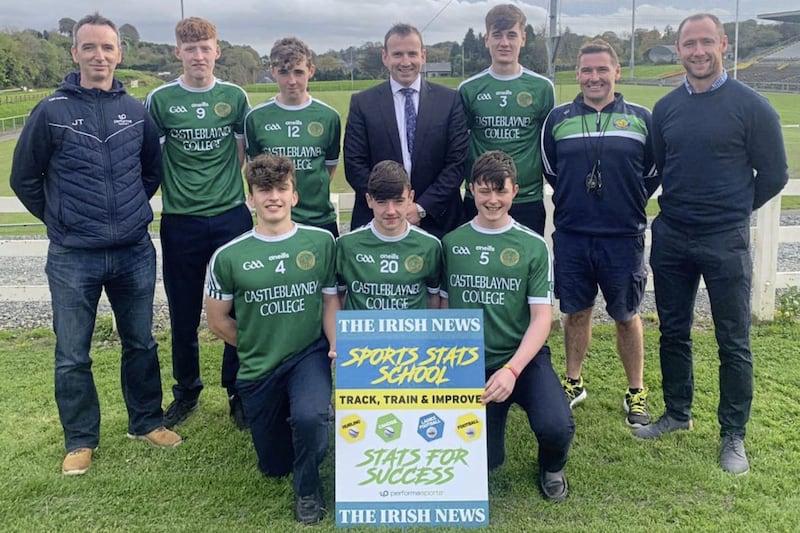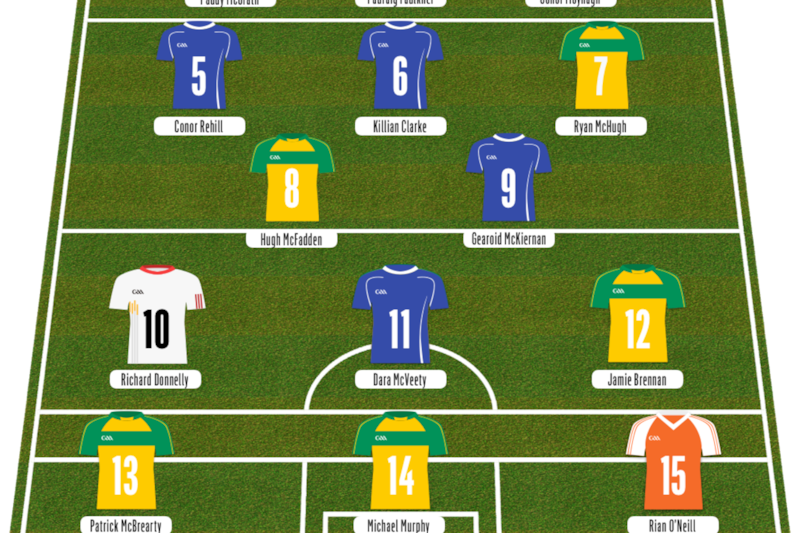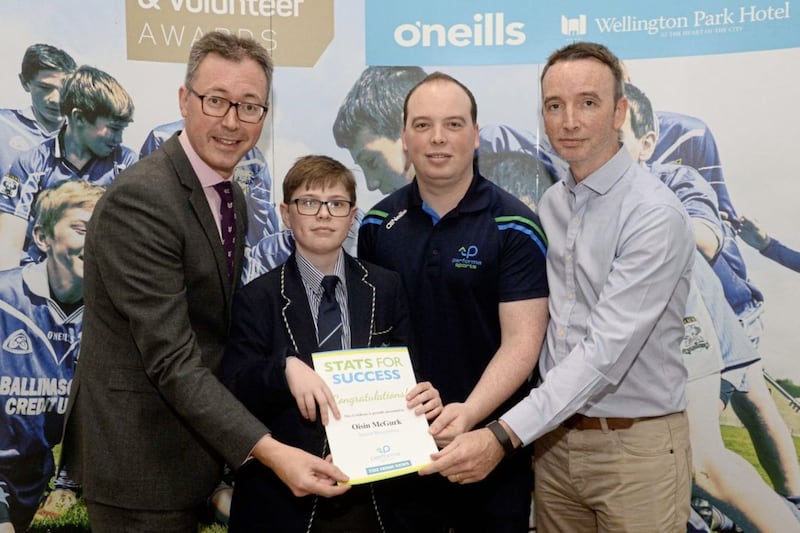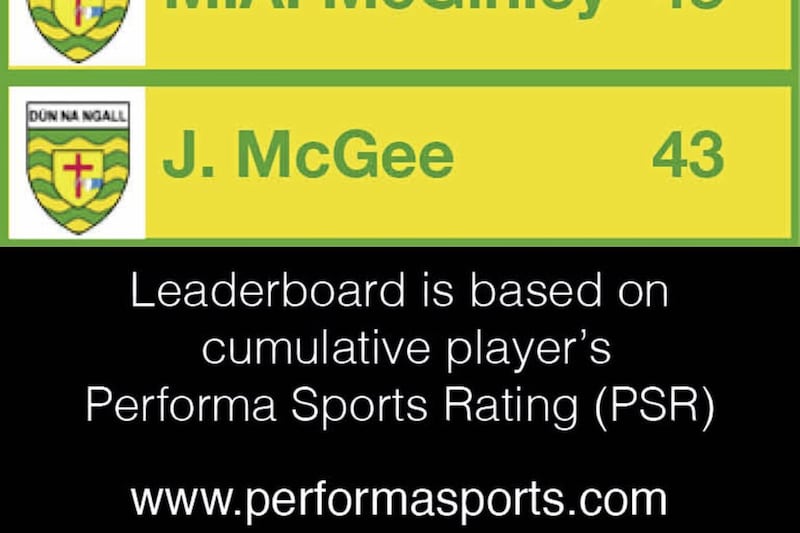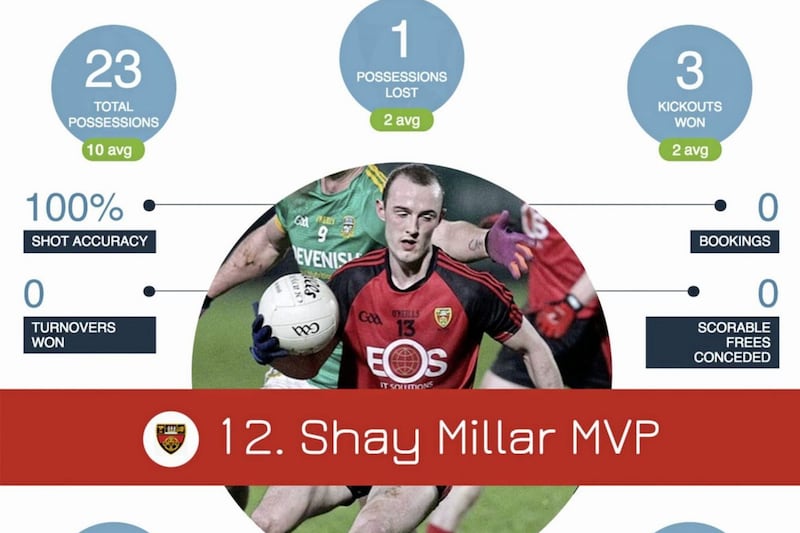GETTING 'a decent club player' to help curtail Marty Clarke in his heyday was always going to involve a certain amount of lawbreaking - but to then venture into smuggling?
An illegally imported iPad was the basis for the Turley brothers, Joe and Danny, moving from crunching tackles into number-crunching and the duo have since made Performa Sports one of the most widely-used and highly-respected performance analysis companies throughout Ireland, and further afield.
They're still working in the field, though, almost literally, based on the family farm in the countryside between Portadown and Lurgan in north Armagh, in the townland of Ballymacrandal.
The four Turley boys learned some football on the land too. Joe, the eldest, was part of the Armagh panel which won the Ulster U21 title in 1998.
The Tir na nOg, Portadown clubman recalls: "There were some really good footballers on that team: the two McEntees, Steven McDonnell, Alan O'Neill - he got a bad neck injury later which curtailed his career, big Paul Hearty in goals. A lot of them went on and eventually got senior success, which was brilliant.
"I'd have been half-back, mainly, but I was a sub on that particular team. Kerry beat us in the All-Ireland semi-final, three points in it, I think, in Parnell Park."
Another of his younger brothers, David was on the '03 panel with Armagh, beaten by Tyrone in the All-Ireland Final. Paul, now an architect in Belfast' coaches underage at St Brigid's.
Yet it was the youngest, Danny, who was the inspiration behind Performa Sports, with his part in another Ulster triumph for the Orchard County.
Not on the field, but just off it. Aged only 17, Danny was the analyst for Armagh Minor footballers. "They won Ulster that year [2005]," recalls Joe, "beat Down, in the precursor to the Armagh-Tyrone [Senior] Final, in Croke Park.
"They kept Marty Clarke to just one point from play. Danny had come up with a couple of ways that they could stop him, which the coaches used.
"Based on that, Joe Kernan brought him into the senior set-up, starting doing the same [work]; he had good coaches around him, a great learning experience.
The analysis was hard, though, says Joe: "Everything was done with pen and paper, watching the game back, very time-consuming.
"Danny played up until Minors or so, took a break, then went back. He would have been a decent club player, but other pursuits distracted him from football when he got to university."
Joe and Danny came up with the idea of developing a product. "There was no live data; everyone had an opinion, but there was nothing to run that opinion against.
"There were heavy, technical products, very video-based, it was a real labour of love to get information back. By the time they were training that information was almost redundant because they were already preparing for the next game.
"Danny knew there had to be a better way, so he developed a prototype on an iPhone to live tag to events, so he had live information that he could reference against.
"The idea was, rather than repeat the process, which is what you used to do in video analysis, you could actually add that to the video, layers of data, as opposed to starting from scratch."
That's when they ventured into smuggling. "In 2005 Apple released a first generation iPad, only ever available in north America. It was a technological opportunity.
"We got one smuggled back home from an aunt who was in the States and dropped the idea of a phone because the iPad suddenly gave us a much bigger screen, something tactile to use. It worked well with video, coaches liked it, could use it as a 'book'. We developed a prototype on it and went from there."
The Turleys then became 'data farmers', but not in any dodgy sense.
"We're still based from home, it's still very much a family business. Our own heritage would be a farming background, so we took over an old farm building on my dad's farm, it's been in the family for four generations, still got the old stone brick.
"We did it up, re-pointed that old stone brick and everything, that's now our office. It's still on a working farm. You wouldn't think it - you walk onto a farm, then you walk into our building and you've lots of technology, screens and equipment. Down the alleyway there's a pen full of livestock."
Performa Sports was first registered in September 2010, coming out of a Jordanstown project at that point.
Joe had done a degree in Sport and Exercise Science at Jordanstown, then, while on a a placement year in Galway had "jumped on plane to take a job at the Olympics in Sydney, 2000, as soon as I completed my degree."
While there, he was a torch escort runner: "Coming into Sydney I used to jog alongside the flame; the last stop before Olympic Village was Manly beach, I was part of the crew, set up the stand for sportspeople and celebrities, part of the guard of honour as the torch was put onto the beach and walked to a boat, then they brought it into the Olympic Village."
After three-and-a-half months there he returned home, having been accepted for a Master's in Communication, PR, and Advertising.
"I really enjoyed that - the bit that really interested me was theory of communication: types of speech, how we communicate, visually, verbally, different ways, how those affect learning. That followed me through.
"Having an interest in sport and coaching, those are really important aspects, and I diversified into other types of analysis, behavioural stuff, the coaching element, as well as how players play - all inter-linked or at least can be connected."
Perhaps unsurprisingly, Joe hesitates, then laughs, when asked who he works with in the GAA world. There's still a shroud of secrecy over some elements of performance analysis.
He does admit: "We'd be quite popular in Ulster, all across Ireland at club level. Probably the number one software supplier for performance analysis for clubs.
"At the moment we work with 15 senior inter-county teams, in football and hurling. Also we work with academies and development panels; some at all levels, others at specific parts of their model or set-up, just depends on what they need."
Performa has branched far from its GAA roots, across both sides of the Atlantic Ocean and over the Pacific too: "Our foundation was Gaelic games, we learnt a lot through that process and continue to do that. We take that story with us wherever we go, talking to people in other sports wherever we go.
"We mainly work in GAA and football or 'soccer', depending on which side of the pond you're on, and have a small but growing presence in other sports."
Performa assist Belgium Women's Basketball, who have enjoyed "really good success at European and World Cup FIBA tournaments; for the first time they qualified for a major international tournament, the Europeans in Spain a couple of years ago, and finished third.
"Another example is floorball, which is played mainly in eastern Europe and Scandinavian countries, it's like ice hockey, played indoors. We've a couple of ice hockey clients as well, based in Canada. Hong Kong Netball are our latest clients, they've just bought a Performa Sports software licence and started to build curriculum coaching content for their players and coaches to support remote coaching.
"We've been progressing all of those, but because we're a small team we always take a focussed view on a sport in a certain territory, try to build a base then grow it, then replicate it somewhere else - then broaden out to other sports.
"Covid obviously was a massive interruption to that process, especially on the east coast of the States; we'd built up a really good network, mainly in soccer, mainly women's soccer.
"We've some clients going back nine years, good feedback and word of mouth build into some referrals. We're sort of starting again in that market as they had a complete stop, only back to normal this year."
Joe enjoys the backing given to performance analysis and coaching in the USA: "In the States, particularly in college sports, they invest in coaching, appreciate coaching. Depending on the level, that can have a massive impact on the monetary resources, on everything they can put in place.
"Usually a D1 [Division One] college would have a full-time coach, an assistant coach, might be a technical coach, and always have a team manager, who does everything, admin, travel, scheduling - but the coaches coach, which I think is a good position.
"The head coach's value is to actually coach the players, same with the technical coaches. Here, coaches have to carry so many hats, a lot falls on them."
Performa Sports, led by the Turley brothers, offer assistance to coaches.
Joe knows there's a perception that the GAA may be more receptive to performance analysis than Irish soccer clubs, but he treats everyone on a case by case basis:
"You're delving into the sociology of sport there, the history and development of each. Some will have assumptions about others that aren't right, just based on their perceptions - for example, I had a meeting with the chairman of a League of Ireland club, and they did implement Performa as part of a performance analysis process.
"He knew I came from a GAA background, and he didn't, he knew people who played high level GAA, and said 'the vast majority are well educated, doctors, architects, etc; go to a soccer club, that's not there, it's the complete opposite'.
"I said `That's a perception: you have to make the choice to change it, or at least give the athletes the choice to be involved'."
Indeed, bringing the best out of players is what Performa hopes to help coaches achieve:
"Analysis is there as a positive aid for the coach, but also to allow coaches to see who in the group wants to do things themselves, so you can unlock that ability.
"In any team sport, which is mainly what we work in, there are always more performers than coaches. It's very hard for the coaches to do the pushing all the time, you have to pull something back.
"That return is what informs a coach: 'He gets it' or 'That's a really good point', or 'We need to spend a bit more time with this particular player or this type of strategy'.
"The players might all be nodding because no one wants to say they don't understand it, but it's clear in what they're doing that they don't [understand], so coaches need to develop it in a different way.
"Giving the players the opportunity will tell you that really quickly. What you're looking for is those who want to make themselves better, which is a personal and often socially-influenced decision."
Performa work with Leicester City FC in their academy, more related to behavioural analysis. Loughborough University researched into the concept of behavioural analysis and the Turleys helped develop a product around that.
"What we learnt, in talk about 'player pathways', the emphasis is almost always on the athlete/ performer - which makes sense up to a point, but you also have to look around them. And what's around them is the coaches. What we saw in Leicester is they had an equal pathway for the coaches, for their development.
"The tool we developed was a way of assessing the type of coach that you are, based on the behaviours you display, and try to fit that with the development and behavioural and social needs of the groups you are with, all underage.
"Leicester are able to use that type of model to help with child ID for coaches, and also look at the development needs for coaches; they've set up a peer group for coaches, so coach to coach could reflect and look at areas, and between them come up with action points and pick a focus to work on to further develop themselves."
There is some resistance to such new ideas, of course.
"Initially when you introduce something like this it's a culture shock, 'Why are you looking at me?! The kids are over there!'
"But more and more people are aware of 'reflection', the ability to look at yourself. It does require a certain strength, there's a vulnerability in it; but if you're able to do that you will get better, you will improve.
"A lot of people in organisations feel they have to watch their back; it takes time to change that culture.
"It got to the point where Leicester would use it for recruitment. Applicants with X number of international caps and league appearances were coming up against younger coaches who didn't have that experience - but the younger coaches were getting selected based on the assessment. They'd do practical tasks, video them and assess them, but also assess how they behaved and interacted with the playing group, and see did that match Leicester's philosophy."
Natural ability remains an important factor, of course, and the idea of 'game intelligence', "but it's not just the performer, it's also the coach," insists Joe.
"I've come across some amazing coaches who have never followed the traditional academic route. There are opportunities now for coaches, but when they look at the application process some haven't done the 'checklist' of a typical academic route. That's real world versus traditional institution, and the two often don't align.
"When we started out, one of our perceptions was that there's a fear of this on the coaching side, people are afraid of numbers.
"Coaches don't want to feel embarrassed, definitely don't want to lose control, or be shown up, anything like that. There are all sorts of barriers, whether real or perceived."
Performa helps to train coaches to work smarter: "We thought technology was an issue: outside of price, it needs to be user-friendly, comfortable, they can make it their own.
"That's one of the reasons we've developed, through an innovation process with Ulster University, a training course. We took something that was inherently academic and, because we were working in the field - literally - we simplified everything down into 'applied' as opposed to theory-driven, then started outreach courses with coaches."
Joe Turley is happy to bring the best out of coaches, whose skill-set he admires greatly: "It is a gift to be able to do that, to understand the pressures on young people today - it's a totally different world to the one we grew up in.
"Give them sport as an outlet, give them the potential to enjoy it, but also improve, compete, and achieve things."




